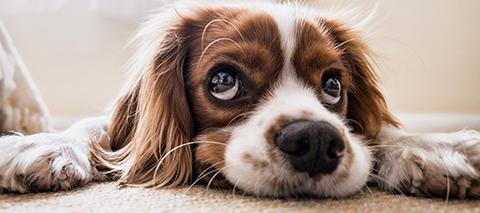The good news is that we are now able to take our dogs for a walk early in the morning and ensure they get some daily exercise. But despite this, those first few weeks of lockdown were tough on our pets and the lack of daily exercise could have had an effect on their health and wellbeing.
We spoke to Lorren Barham from Pet Wellness Worx, an expert in pet wellness and physical rehabilitation about some of the pet health issues that have become increasingly common as a result of the confinement of lockdown; and what we can do to ensure the health and wellbeing of our pets as we continue to spend more time at home.

Three common problems:
1. Orthopaedic conditions and joint inflammation
Orthopaedic conditions can be very painful and lead to chronic inflammation. These include common problems such as hip dysplasia, elbow dysplasia, cruciate ligament disease and osteoarthritis. Some conditions typically occur due to genetics and/or old age but these seem to be flaring up as a result of our dogs not being able to get their usual exercise. If your pet is suffering from an orthopaedic condition or joint inflammation, you might notice they have a bunny hopping gait with their hind legs or they are limping and have difficulty jumping up onto things. You can find out more about joint pain in pets here.
If you suspect any orthopaedic problems, seek the expertise of a professional. Treatment may range from surgery to physiotherapy (including some of the exercises mentioned below to keep muscle strength and flexibility).
2. Weight issues
Due to the limited amount of exercise our pets are currently getting, they are at risk of putting on weight (they simply are not burning the calories they would normally). If your pet is heavier than he or she should be, this can put more pressure on joints or open the doors for more health issues further down the line. We suggest monitoring their weight and food portions to avoid weight gain.
3. Boredom and behavioural issues
We are all struggling with social distancing and isolation, including our pets. If your dog has not been able to exercise as usual or interact and play with other dogs; and been confined to a small space, you may notice many more behavioural issues such as chewing, or more wild behaviour as they seek to release some of their frustration.
Three things you can do to help:
1. Think of creative ways to exercise
Many of us will need to think creatively about exercising our pets if we are spending more time at home and out of our usual routines. Maintaining good muscle form is so important as any degeneration will only lead to more joint pain and it’s critical to keeping boredom at bay. See the ideas below to get those muscles and minds moving!
2. Make sure you're feeding your pet the right diet
A good quality and specially-formulated diet provides the right nutrients to fuel the body and allow it to function properly. It can therefore prevent many conditions and ailments such as degenerative joint disease; diabetes; dental problems; urinary tract disease and skin and coat concerns.
Right now, consider the diet you are giving your pet and the quantity. Also remember that every time you go to the kitchen or fridge, your pet does too. Lorren recommends having a Ziplock bag in the fridge full of raw cut carrots – they may just think you are eating all the carrots, too!
See the full Absolute Pets dog food range here.
3. Make your pet comfortable!
For any joint issues, make sure your pet has a warm, padded and comfortable place to sleep that is at floor level. If the world feels upside down, help them feel safe by creating a new routine and sticking to it and making sure they know where their ‘safe’ space is in the home.
Exercises and games that get the muscles and minds moving!
Think of ways to maintain or improve a range of motion, build good posture and muscle mass.
1. Treat to tail stretch. Ask your dog to stand. Then use a treat to encourage them to bend to either side of their bodies and then down in between their front limbs and up so you are stretching their sides and neck.
2. Balance and weight shifting exercises. Place your pet in a square position and gently rock them from side to side and backwards. As they grow stronger this can be attempted on more unstable surfaces.
3. Circles or figures of eight walking. Start with big circles and slowly progress to smaller ones. Cones can be used to ensure they don’t cheat and maintain the correct circle size.
4. Make an obstacle course. Use anything you have in your home from front door mats to hula hoops, a chair or a bucket; and lead them through and around using treats to help keep their focus.
5. Try one of these eight fun ideas to keep your dog entertained (including ideas for interactive toys).
Speak to an expert
If you are in any way concerned about your pet, speak to your vet or animal behaviourist. You can find out more about Lorren Barham from Pet Wellness Worx here.
Get in touch
A huge thank you to Lorren Barham from Pet Wellness Worx for sharing her expertise with us and helping us put together this article.
And remember, we are also here to help so visit your local Absolute Pets store or get in touch with us online, or on Facebook.